As Facebook continues to shift their priorities to meet the needs and behaviors of their users, Facebook Groups have recently taken a leading role in the platform’s efforts to build community.
For social media practitioners, this means that Facebook Group marketing needs to be a top consideration when it comes to your social media strategy and Facebook best practices.
Defined by their casual, conversational format, it’s no surprise that Facebook Groups have risen in popularity over the public feed. Not to mention, being a member of a group feels more exclusive than being just another follower.
For brands, Facebook Groups are an opportunity to cultivate community and create a direct line of communication with customers. Think of a Facebook Group as a space for your brand’s most dedicated fans. These fans are the ones who drive the conversations around your business on Twitter, tune into your Instagram Lives, and support every product launch, so it’s important to nurture those relationships and hopefully create lifelong customers out of them.
If you’re looking to up your Facebook Group marketing in 2021, here are our top tips.
Starting a Facebook Group
Have a strategy in place
Even though a Facebook Group is a more relaxed space compared to the polished public page, it’s not something that should be thrown together just because your boss told you to or because you feel like your brand needs to be active on every channel possible.
Just like the rest of your social media efforts, your Facebook Group marketing needs to be thought out before you even get started. What’s your goal of starting a Facebook Group? What type of content will you publish to help meet that goal? That’s not to say that you have to run a full campaign for everything you post, but everything should be aligned with your overall social media marketing strategy.
Whether you have a content calendar with a list of all of the weekly themed posts or a target number of members you want to have, create a loose structure and goals for the group so that it’s still actively contributing to your brand’s overall social media marketing strategy.
Choose between Public and Private
Before you can dive into Facebook Group marketing, there are a few administrative steps to get out of the way. The first being the level of privacy and discoverability you want your group to have. Though Facebook’s privacy options for Groups only include Public or Private, there are essentially three ways to go about it.
The first setting is Public which means anyone on Facebook can discover and join the group. If a group is Public, anyone can also see the content of the group, even if they haven’t joined. While this setting may be beneficial for the discoverability of your group, being open to anyone also diminishes the exclusivity of the group and can make it more of a challenge to manage the community aspect.
The other option you have is to make your group Private. If a group is private, then only members who either ask or are invited to join will be able to see the content and discussions of the group. You can also choose to implement an additional layer of privacy by changing the discoverability of the group. If you make your group Visible, then people on Facebook can search for your page or see it listed in suggestions. Or, you can make your group hidden which means your group won’t be searchable and won’t be shown as a suggestion for people on Facebook.

Facebook outlines the differences between Public and Private groups.
Establish ground rules
Establishing rules for your Facebook Group is essential. Not only do rules set the tone and expectations of your group from the start, but they help ensure that everyone is respectful of each other and feels as if they’re part of a safe space.
If your group is private and members need to go through an approval process to join, you can choose to have new members review and agree to the rules before they are accepted. Doing this adds a layer of accountability and gives admins the leeway later on to eject someone from the group in the unfortunate circumstance in which someone isn’t following the rules.
You can make up to 10 rules for your Facebook Group. These can be anything from limiting the amount of self-promotion that can take place, not tolerating certain types of behavior, or encouraging the use of inclusive language (we put together an entire Inclusive Language Guide if you’re interested in implementing that).
If you’re struggling to figure out what types of rules would be best for your community, lean on your brand values to get started. For instance, one of our brand values at Rival IQ is transparency. If we wanted to create a Facebook Group that aligned with our values, we’d make one of the group rules something along the lines of being transparent when posting (e.g. no leading posts or posts that are secretly self-promoting).
Facebook also recommends establishing rules that encourage engagement, rather than just stating what people can’t do or say in the group.
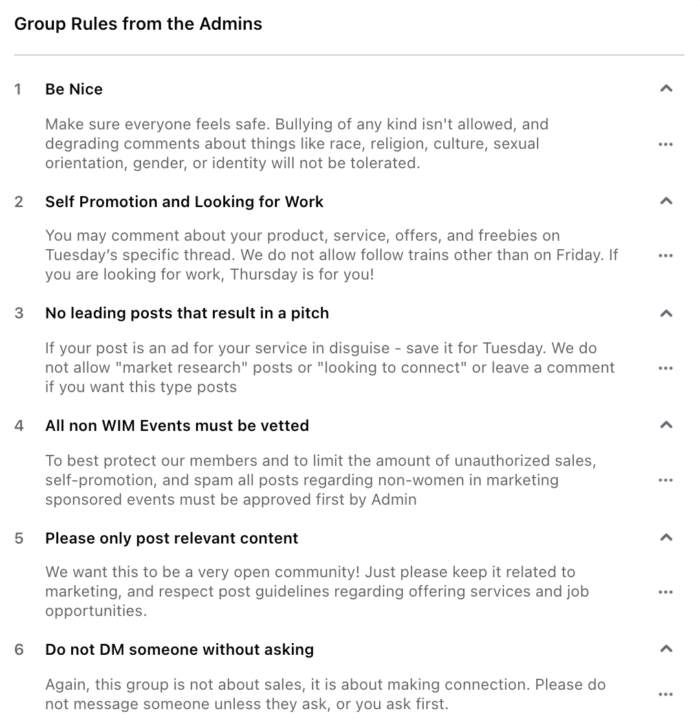
Here are some of the rules members of the Women in Marketing Facebook Group must follow when they join.
Have a designated admin
Just like any sort of organization, every Facebook Group needs an admin. The admin is critical to maintaining the posting consistency, engaging the community, and ensuring that everyone is following the rules. The bigger and more active your Facebook Group gets, the more important the admin role is.
Make sure there is a person on your team who can commit to being the admin for your group. This role would be best for someone like a community manager who is already familiar with what running an online community entails. In addition to managing the admission or approval process, the admin also needs to be able to monitor discussions and respond to questions and comments in a timely manner.
Once your group gets big — we’re talking thousands of members big — you may even need multiple admins to handle all of the tasks involved.
Optimize your Facebook Group for search
Just like you would optimize your public page, your Facebook Group should be designed in a way that makes it easy to find. Make sure the name and description of the group is something that people will be searching for yet aligns with what the page is about.
You should also include a header and profile image that accurately represents what the group discusses and shares. These elements are especially important if you’re running a private group since people who aren’t members can’t see the content of the group; the description and header image may help them decide if they want to join or not.
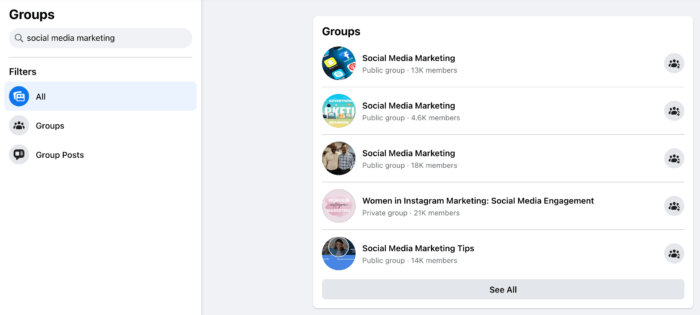
These Facebook Groups have optimized their Group names for the search “social media marketing.”
Running a Facebook Group
Post consistently
Unlike the feed, there aren’t any limitations around how often you should post in a Facebook Group. While there are certain times that are best to post on Facebook, your posting schedule and consistency should be based on when your group members are active. And fortunately for data-driven social media marketers, Facebook has enabled insights for groups so you can actually see when members are active and engaged.
To make sure you’re posting consistently and getting the most out of your Facebook Group marketing, come up with a few different types of posts or threads that you can post each week. Keep in mind that members will be having their own discussions and will likely post multiple times a day. But as the host of the group, you may need to prompt conversations at first.
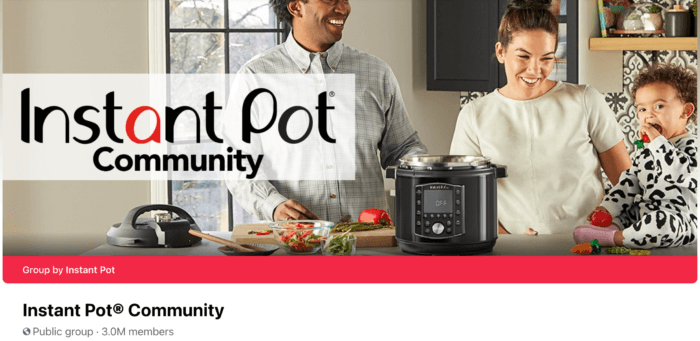
The Instant Pot Community Facebook Group has 3 million members, and members post hundreds of times per day.
For example, let’s say you run a group for social media managers. You could post a weekly “Follow Friday” thread where members can share their brand’s social handles in the comments in hopes of gaining more followers from the group. These posts are important to get people talking and potentially increase engagement. You can even create custom graphics that go along with the themed posts to add another engaging element to it. And speaking of engaging…
Use engaging content types
Just like any other social platform, prioritizing engagement is just as important for successful Facebook Group marketing — especially when the platform is as community-driven as a Facebook Group.
Experiment with the different types of content you can use in a group. Rather than posting a simple question or prompt, take advantage of interactive elements like polls, GIFs, videos or even Facebook Live if it makes sense. Facebook Groups are also a great place to collect user-generated content. In a private setting, members may feel more comfortable sharing a snap of their workspace, their pet, or their favorite product — whatever the ask may be — than they would in the public feed. Leverage the more intimate feeling of the group by encouraging different types of engagement than you would on the public page.
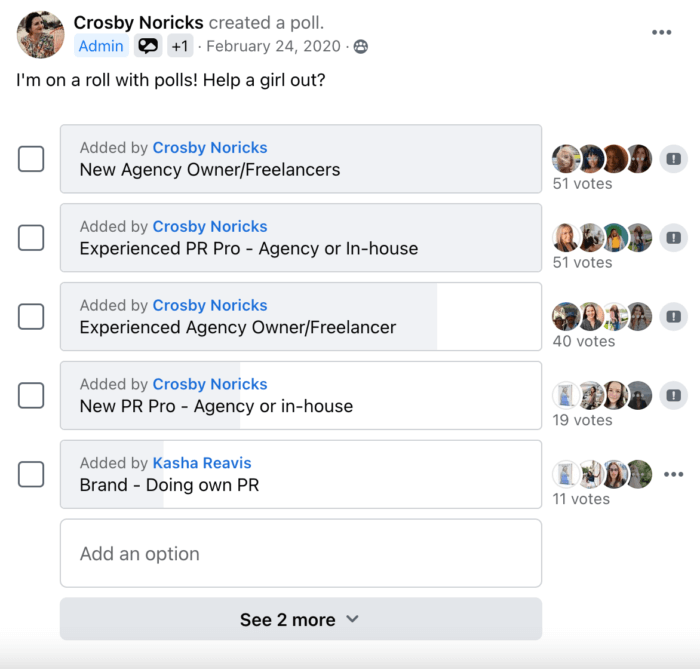
In The PR Couture Facebook Group, a group for PR professionals, a poll prompts members to vote for how they identify in the group.
Listen to your group members to spot potential content
We’ve said it before, and we’ll say it again: social listening is a powerful way to monitor what’s being said about your brand outside of direct mentions. Though Facebook’s Group insights are limited when it comes to using a social listening tool, there are other ways to find out what your group members are talking about and create member-driven content that they’ll engage with.
Keep an eye on what types of discussions or topics are frequently brought up and figure out how you can leverage those conversations to create content that matters to your members. For instance, if you notice that members of your social media managers group ask a lot of questions around Reels, you could host a Facebook Live with a Reels expert to answer all of their questions around that topic at once. For extra credit, pin that video to the top of the group page to garner additional views.
Promoting your Facebook Group
Leverage your following
Since a Facebook Group is likely not the first social media platform you established, it’s safe to say you’ve built up your following on other platforms. Don’t be afraid to cross-promote! Especially if you’re getting your Facebook Group up and running, it would be beneficial to mention it on other platforms when relevant. You can even consider creating content that’s exclusive to the group and would entice followers from other channels to join.
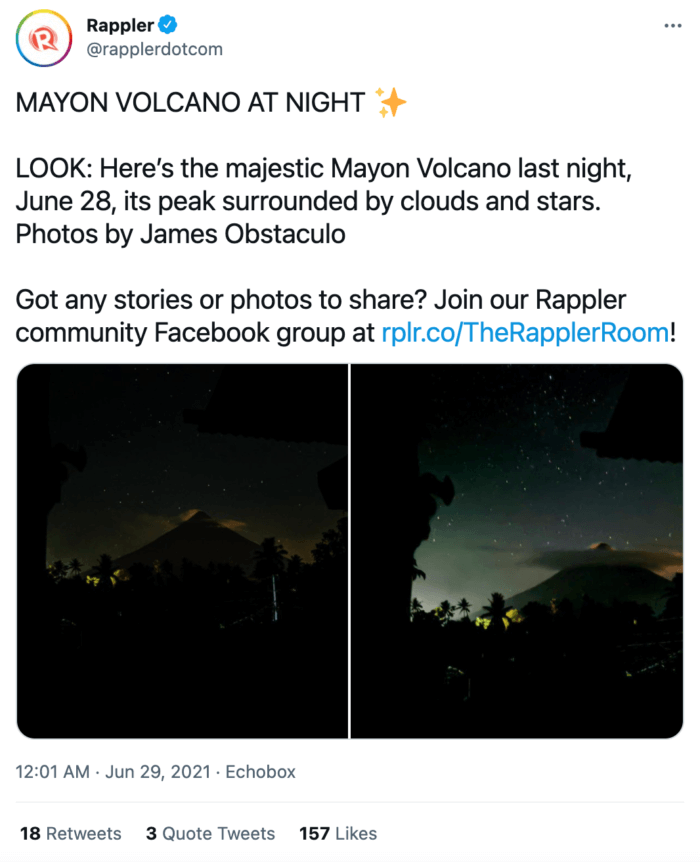
Rappler harnesses its large Twitter following to promote joining its community Facebook Group.
Join other Groups
Social media marketers would be wise to join other groups on Facebook, whether they’re industry-related or of personal interest. Gaining perspective as a member rather than an admin can help shape how you approach your own Facebook Group marketing. It might even be a good idea to join groups that cover a completely different topic than yours so you can pick up new content ideas and experiment with them in your brand’s group.
Wrapping it up
Though similar to a Page in terms of capabilities and function, Facebook Groups offer a more direct line of communication to your audience and emphasize the feeling of community. By using these tips for your Facebook Group marketing, you’ll be on your way to building an engaged community around your brand in no time.
